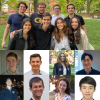news
Improving the Human Condition Through ISyE Senior Design
Primary tabs
In 2020, Georgia Tech announced its new mission statement: “to develop leaders who advance technology and improve the human condition.” Some students in the H. Milton Stewart School of Industrial and Systems Engineering (ISyE) are meeting this challenge through their Senior Design projects. With these projects, ISyE students typically solve complex problems presented by real-world clients, and for the Spring 2021 semester, two teams produced solutions that have made a direct community impact.
“Georgia Tech ISyE students are equipped with the skills and knowledge to tackle opportunities in public service with the same passion and rigor they apply to private companies,” noted ISyE Director of Professional Practice and Senior Design Coordinator Dima Nazzal. “The impact of the data-driven solutions they devise can be measured not only by monetary savings but also -- more importantly -- societal impact.”
One such team, nicknamed “Watt-lanta,” was led by Jordi Sabria (IE 2021). After meeting with a handful of companies, the team chose to work with the Atlanta Department of Transportation (ATLDOT) because they would not only be helping the client but the local community as well. ATLDOT tasked the team with identifying specific neighborhoods and streets that could benefit from streetlights.
“We looked at multiple studies showing that increasing lighting actually reduced crashes and crime by a significant amount, so our client believed there was a big opportunity here,” said Sabria.
Accordingly, team Watt-lanta identified the neighborhoods, most of which were located in the south and west areas of Atlanta, and the streets in most need of lighting.
“This was not just a technical problem; this was also a social problem,” Sabria said. “We had to take into account the city’s people, society, constituents, public safety, and equity.”
Watt-lanta’s work was so impactful that its results garnered local media coverage.
“Our team had the chance to present to the transportation committee of the City of Atlanta,” said Sabria. “Immediately that afternoon, the mayor announced a historic expansion of 10,000 streetlights. This was exciting news for us, because it means that it’s going to get done.”
Another team that made a significant social impact was “Improving the Children’s Condition,” led by Morgan Knowlton (IE 2021).
Having experiences with foster care in their own families, Knowlton and her teammates reached out to the Georgia Division of Family and Children Services (DFCS). Reducing the burden on caseworkers improves outcomes for both the caseworkers and children under the care of the state, an idea the team used as the basis for their project.
“One of the main conclusions we reached was that it’s beneficial for neighboring counties to share case managers,” said Manny Jonson (IE 2021). “Not only did we give DFCS specific numbers on how many caseworkers we suggest they hire, but we also targeted smaller counties specifically, where it wouldn’t take much investment for them to dramatically reduce employee workloads.”
From their conclusions, the team created a deliverable that provided explicit information to help DFCS equally distribute caseloads now and in the future.
“The experience itself was encouraging -- it is reassuring to know the future of the world is in the hands of such an impressive group of young men and women,” said DFCS Division Director Tom Rawlings.
Knowlton was inspired by the Institute’s new mission statement to choose this risky and unique project, reflected by her team’s name.
“I saw the new mission statement as a call to action, a challenge, given by Georgia Tech to its students. I felt like this was the direction that Georgia Tech wanted to go, and that gave me the final push of confidence that I needed to pursue this project,” she said. “I had an amazing team, and I hope that our project encourages future teams to prioritize selecting a project with a social good aspect. If we’re going to be engineers who improve the human condition, we’ve got to get into these spaces.”
Groups
Status
- Workflow status: Published
- Created by: afu34
- Created: 07/14/2021
- Modified By: Andy Haleblian
- Modified: 08/03/2021
Categories
Keywords
User Data

